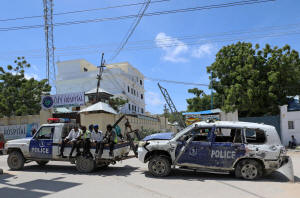U.S. decision to withdraw troops dismays some Somalis
 Send a link to a friend
Send a link to a friend
 [December 05, 2020]
By Katharine Houreld [December 05, 2020]
By Katharine Houreld
ADDIS ABABA (Reuters) - President Donald
Trump's decision to pull U.S. troops out of Somalia in the waning days
of his presidency triggered dismay on Saturday from some Somalis, who
appealed to the incoming U.S. president to reverse the decision.
"The U.S. decision to pull troops out of Somalia at this critical stage
in the successful fight against al-Shabaab and their global terrorist
network is extremely regrettable," Senator Ayub Ismail Yusuf told
Reuters in a statement, referring to the al Qaida-linked al Shabaab
insurgency.
"U.S. troops have made a huge contribution and had great impact on the
training and operational effectiveness of Somali soldiers," said Yusuf,
a member of Somalia's Senate Foreign Affairs Committee.
He tagged U.S. President-elect Joe Biden in a tweet criticising the
decision.

The Somali government could not immediately be reached for comment early
on Saturday to Friday's decision to withdraw almost all the roughly 700
U.S. troops by Jan. 15.
Somalia's fragile internationally backed government is due to hold
parliamentary elections this month and national elections in early
February, a precursor to the planned drawdown of the 17,000-strong
African Union peacekeeping force.
U.S. troops have been in Somalia, mostly supporting Somali special
forces known as Danab in operations against al Shabaab, whose attacks in
nations like Kenya and Uganda have killed hundreds of civilians,
including Americans.
SUPPORTING SOMALI FORCES
Danab punches above its weight because regular forces are often poorly
trained and equipped, frequently desert their posts or become enmeshed
in power struggles between the national and regional governments.
If the withdrawal is permanent, "it will have a huge toll on
counterterrorism efforts," said Colonel Ahmed Abdullahi Sheikh, who
served for three years until 2019 as the Danab commander.
[to top of second column]
|

Somali police officers tow their car from the scene of a roadside
explosion in Hodan district of Mogadishu, Somalia July 8, 2020.
REUTERS/Feisal Omar/File Photo

He fought alongside U.S. forces, he said, and during his command two
Americans and more than a hundred of his own men had died. Both U.S.
and Somali forces opposed the withdrawal, he said.
The U.S. program to expand Danab to 3,000 men was supposed to
continue until 2027, Sheikh said, but its future is unclear.
Airstrikes will likely continue from bases in Kenya and Djibouti,
which could also provide a launchpad for cross-border operations.
Rights group Amnesty International says the airstrikes have killed
at least 16 civilians in the past three years.
The U.S. withdrawal comes at a turbulent time in the region.
Ethiopia, which is a major troop contributor to the peacekeeping
forces and has thousands more troops in Somalia bilaterally, is
distracted by an internal conflict that broke out last month. It has
disarmed hundreds of its peacekeepers already.
Somalia has been riven by civil war since 1991, but the entry of the
peacekeeping force in 2008 helped incubate fledgling government
structures that allowed for gradual reforms of the military, such as
a biometric system to pay soldiers and the formation of Danab.
But many problems with the Somali military remain, including
corruption and political interference. Perhaps a withdrawal will
force Somalia to confront them, said Sheikh. Or perhaps it will make
them worse.
(Reporting by Katharine Houreld in Addis Ababa; Editing by William
Mallard)
[© 2020 Thomson Reuters. All rights
reserved.] Copyright 2020 Reuters. All rights reserved. This material may not be published,
broadcast, rewritten or redistributed.
Thompson Reuters is solely responsible for this content.
 |